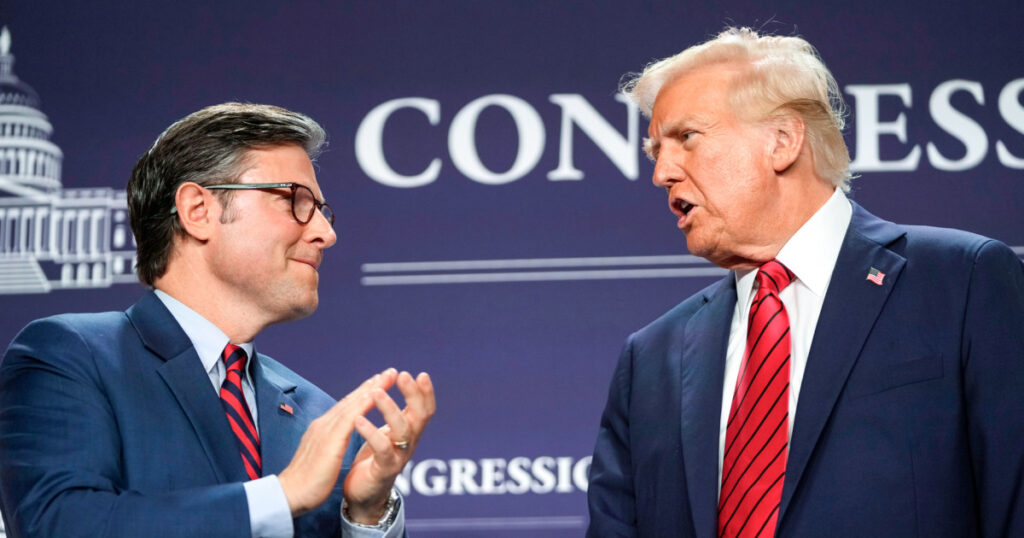

Welcome to the online version of From the Politics Desk, an evening newsletter that brings you the NBC News Politics team’s latest reporting and analysis from the White House, Capitol Hill and the campaign trail.
It’s a “big, beautiful” edition of the newsletter today, as we break down the political ramifications, historical context and next steps for President Donald Trump and the GOP after the House passed the party’s sweeping domestic policy package.
Programming note: We are taking a few days off for the holiday weekend and will be back on Tuesday, May 27. Have a restful Memorial Day!
Sign up to receive this newsletter in your inbox every weekday here.
— Adam Wollner
Trump has history on his side with his ‘big, beautiful bill’
By Jonathan Allen
After the House passed a bill for President Donald Trump’s agenda early Thursday morning by a single vote, the measure faces more hurdles in the Senate.
But don’t bet against it becoming law.
There’s a long history of presidents getting Congress to deliver their top legislative priority, even when other items fall by the wayside. That’s especially true when the president’s party controls both chambers, as Trump’s GOP currently does. Because of congressional rules, so-called budget reconciliation bills — like the one Trump is trying to get to his desk — only need a simple majority to pass in the Senate.
For that reason, Trump was smart to roll a series of his major proposals into a single bill covering much of his agenda on taxes, immigration and more.
Even for Republicans who aren’t in love with every provision, it is politically perilous to stand in the way of a president of their own party. When push comes to shove, few will be willing to alienate their base voters to kill the newly elected president’s plans. And if Trump loses the battle, he will make sure GOP voters know which lawmakers betrayed him.
There may ultimately be a political downside for some Republicans who stick with Trump with the broader electorate, but there’s no upside in turning him into an enemy in either a primary or a general election. No Republican can win a swing state or district if the GOP base doesn’t turn out for them. Trump may be more openly vindictive than most recent presidents, but similar dynamics are always at play.
In 1993, President Bill Clinton and a Democratic-led Congress prioritized his economic recovery package — not the more memorable “Hillarycare” health insurance proposal. He passed the budget plan, while Hillarycare fell apart.
In June 2001, President George W. Bush, with a Republican Congress behind him, enacted a major tax cut on bipartisan votes in the House and Senate.
President Barack Obama’s stimulus law flew through Congress — with Democrats in control of both chambers — in February 2009. And after months of fierce debate, he managed to sign the Affordable Care Act into law in March 2010.
Arguably, the big exception came in Trump’s first term, when the Senate — on a decisive vote by then-Sen. John McCain, R-Ariz. — killed a push to repeal Obamacare. But Trump did get a signature tax law from the Republican-led Congress.
In 2021, the Democratic-led Congress quickly sent a pandemic recovery bill to President Joe Biden’s desk at the outset of his term. The rest of his “Build Back Better” plan ran into snags and had to be reformulated and slimmed down to make it across the finish line.
Some Republicans may distance themselves from Trump’s agenda as the midterm elections approach, but that day has not yet come. And the smart money is on him eventually signing his “big, beautiful bill” into law.
How the Trump agenda bill will shape the next election
By Ben Kamisar and Alexandra Marquez
Republicans’ megabill is now set to play a major role in shaping the fight over who controls the House after the next election.
Democrats need a net gain of just three seats next year to take back control of the chamber, after the GOP won the smallest House majority in almost 100 years in the last election. And they’ve already started peppering the airwaves with attacks accusing the GOP of slashing Medicaid and prioritizing the wealthiest Americans.
But Republicans are betting that the measure holds the key to proving to voters why they should grant them two more years of unified control of Washington, as opposed to the midterm backlash that typically hits a president’s party. The GOP sees a bill that could energize Trump supporters by enacting his agenda and delivering key swing-state lawmakers some tangible victories to tout on the campaign trail.
“The American people gave us a mandate in November. They sent a message with their vote. They gave this side of the aisle the power, and we’re going to use it to make their lives better,” House Speaker Mike Johnson, R-La., said.
House Minority Leader Hakeem Jeffries, D-N.Y., sounded a different note: “When the votes are ultimately cast on that first Tuesday in November next year, this day may very well turn out to be the day that House Republicans lost control of the United States House of Representatives.”
Read more on the midterm politics of the bill →
The defectors: Only two House Republicans, safe-seat Reps. Thomas Massie of Kentucky and Warren Davidson of Ohio, joined every Democrat in voting against the bill, saying it will further balloon the U.S. deficit.
While Davidson’s opposition came as a last-minute surprise, Massie had long made clear where he stood on the legislation.
As Ben Kamisar and Scott Bland write, Massie is one of the rare Republicans who has found himself at odds with Trump on multiple occasions but has lived to tell the tale. The question is whether the tension evaporates as it has before or if Trump actually takes the step of backing a primary challenger against him in 2026.
Prior to Thursday’s vote, Trump blasted Massie as a “grandstander” who “should be voted out of office” — criticism Massie has pointed to in fundraising appeals for his own campaign.
“That’s a step up,” Massie said of Trump’s threats. “In 2020, he wanted me thrown out of the GOP, so losing a seat wouldn’t be as bad as being thrown out, would it?”
“I think that’s hyperbole on his part. I’m not worried about it,” Massie continued.
Read more on Massie →
➡️ Explainer: Here’s what’s in the sprawling Trump agenda bill House Republicans just passed, by Sahil Kapur and Scott Wong
✉️ Mailbag: The GOP’s megabill moves to the Senate
Thanks to everyone who emailed us! Here is this week’s reader question:
“On the spending bill, will it go through the Senate? How many will oppose it?”
One thing is clear at this point, hours removed from the House’s passage of a massive bill for Trump’s agenda: The Senate won’t pass it as it’s currently written.
For weeks, GOP senators have outlined a variety of concerns with the measure their House colleagues put together. That list includes: the impact to the U.S. deficit, the level of Medicaid cuts, the rollback of clean energy tax credits and the higher cap for the state and local tax deduction.
It will be Senate Majority Leader John Thune’s job now to work through all these issues in the coming weeks. He can only afford to lose three Republican votes on the Senate floor — and he’s already lost Sen. Rand Paul of Kentucky, who staunchly opposes a provision in the bill that raises the debt ceiling. Sen. Ron Johnson of Wisconsin has even said he still wants to split up the sweeping legislation into two parts.
But as Jonathan Allen writes above, when push comes to shove, skeptical Senate Republicans may find it difficult to stand in the way of the president and his agenda.
Another complicating factor is that any changes the Senate makes to the package will have to go back through the House before GOP lawmakers can send the bill to Trump’s desk, which they are hoping to do by July 4.
— Adam Wollner
🗞️ Today’s other top stories
- ⚫ Attack in D.C.: A gunman shot and killed two Israeli Embassy staff members outside the Capital Jewish Museum in Washington, D.C., on Wednesday night. Read more →
- ⚖️ In the courts, part 1: Oklahoma will not be able to launch the nation’s first religious public charter school after the Supreme Court deadlocked 4-4 in a major case on the separation of church and state. Read more →
- ⚖️In the courts, part 2: The Supreme Court also granted a Trump administration request that allows the president to fire members of independent federal agencies. Read more →
- ⚖️ In the courts, part 3: A federal judge in Massachusetts issued an injunction blocking the Trump administration from dismantling the Education Department and ordering that fired employees be reinstated. Read more →
- ⚖️ In the courts, part 4: A federal judge in California blocked the Trump administration from terminating the legal statuses of international students at universities across the U.S. Read more →
- 🏫 Trump vs. Harvard: The Trump administration on Thursday halted Harvard’s ability to enroll international students amid an ongoing standoff between the government and the Ivy League school. Read more →
- 🪑 A seat at the table: More than 200 wealthy, mostly anonymous crypto buyers are coming to Washington to have dinner with Trump. The price of admission: $55,000 to $37.7 million. Read more →
- 📝 Ctrl, alt, delete: The White House has removed official transcripts of Trump’s public remarks from its website, replacing them with selected videos of his public appearances. Read more →
- 🪙 Penny for your thoughts: The Treasury Department said it made its final order of blank pennies this month as it moves to end production of the one-cent coin. Read more →
- Follow live politics updates →
That’s all From the Politics Desk for now. Today’s newsletter was compiled by Adam Wollner and Ben Kamisar.
If you have feedback — likes or dislikes — email us at politicsnewsletter@nbcuni.com
And if you’re a fan, please share with everyone and anyone. They can sign up here.
 Latest World Breaking News Online News Portal
Latest World Breaking News Online News Portal






